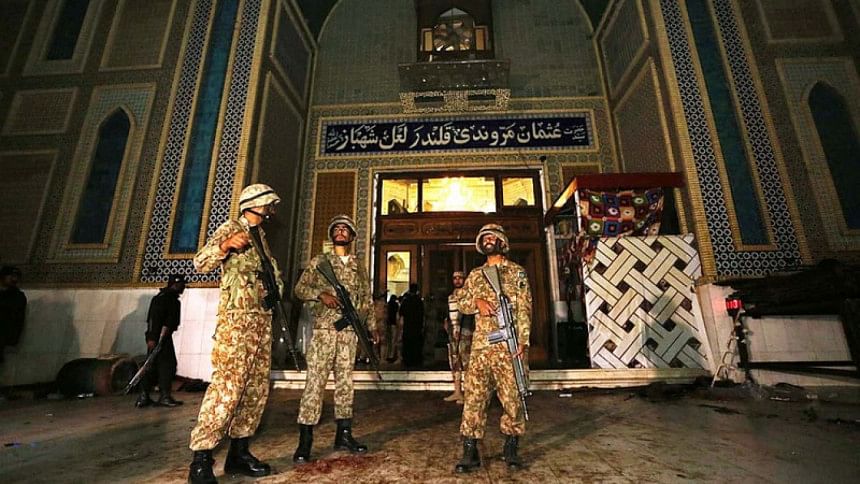Militancy strikes Pakistan hard

Recent attacks in Pakistan including incidents in Punjab, Sind and Khyber Pakhtunwala suggest that the various militant outfits are trying to coordinate attacks on Pakistani security forces and religious minorities that include Shias, Christians and Hindus; members of the judiciary, civil society activists are also on the hit list. All this points to a whole new scenario for the military that is already overstretched and one that is suffering from a trust deficit with its age old ally, the United States (US).
With over a hundred people wounded or killed in the attacks, the military responded in kind with some 100 militants killed in counter insurgency operations, and as reported by Jane's Terrorism & Insurgency "The military also announced the indefinite closure of the border with Afghanistan, following further public criticism of the Afghan government's perceived reluctance to crack down on Pakistani militants on the Afghan side of the border." The fact of the matter is that terrorism cannot be rooted out by military operations alone. The US intervention for more than a decade in the Middle East and elsewhere is testament to that. For Pakistan, things seem to be going from bad to worse as mass casualty due to terrorism is on the rise.
One has to take into account that the terrorist outfits do not operate alone anymore, they have allies and sympathisers who are united by ideology and as in the case of Pakistan, also sometimes by tribal ties.
As per media reports, we are informed that the military is reorienting its operations with a counter terrorism focus and has led to ordering an unspecified number of AW139 helicopters from the Italian defense firm Leonardo S.p.A. Despite strained relations with the US, Boeing is delivering 3 AH-1Z Viper twin-engine attack helicopters this year and the remaining 9 will arrive in 2018. These helicopters will be deployed in counterinsurgency operations and as per a US Defense Security Cooperation Agency statement in April 2015: It will enhance "Pakistan's ability to conduct operations in North Waziristan, the Federally Administered Tribal Areas (Fata), and other remote and mountainous areas in all-weather, day and night environment." From Russia, Pakistan is getting 4 Mi-35M attack helicopters this year. Indeed, Islamabad may also be getting the T-129 attack helicopter from Turkish Aerospace Industries and from China; it may acquire the Chengdu Aircraft Industry Group's Z-10 as an alternative to the Russian Mi-35.
While all these military hardware will certainly help to conduct better counterinsurgency and counterterrorism operations, the solution to the problem that Pakistan faces is not entirely military in nature. With a porous Afghan border and strained relations with Kabul, terrorists move with ease from one country to another in the face of large military operations. One has to take into account that the terrorist outfits do not operate alone anymore, they have allies and sympathisers who are united by ideology and as in the case of Pakistan, also sometimes by tribal ties.
A different view to the conflict is presented by Abbas Nasir, former editor of Dawn in his article 'What military ops can't deliver' published in that paper recently: "To me, a larger battle will be the one to somehow move society to a 'live and let live' state from the current intolerant, even bigoted, environment. I recall with horror the recent forced disappearance of five social media activists (one remains missing). All their detractors needed to do was to plant a suggestion or two in the public sphere that those gone missing were guilty of blasphemy for some of the self-proclaimed guardians of our faith to start acting like a lynch mob and baying for their blood. Did a single one of them bother to ascertain for themselves – as decency, law and most of all any faith would require – if what they were accusing the 'disappeared' of was based on facts? No. It is much easier to join a galloping, frothing-at-the-mouth hysterical herd than to stop and examine the facts."
As pointed out by Mr. Nasir, the sermons by radical religious leaders that followed the sentencing and later execution of Mumtaz Qadri, the man who killed the Punjab Governor Salman Tasser have not stopped. It is also worth pointing out that the head of the Ruet-e-Hilal Mufti Munibur Rahman, who happens to be a leading religious leader has gone as far as to state that dhammal which is a dance done at Sufi shrines and which is participated by both men and women apparently goes against the teaching of the saints.
Those are the ground realities in Pakistan as elsewhere in other Muslim majority states including Bangladesh where the State essentially views religious extremism as a security problem that can be exterminated using overwhelming force. But as pointed out by Mr. Nasir and others, the root of terrorism is deeply ideological in nature and ideas must be fought with ideas as well as with arms. We keep forgetting that to make a dent in the recruitment of terrorists, which is increasingly sophisticated in nature (as seen by Islamic State's ability to draw people of different educational qualifications from different parts of the world to fight for what it calls the 'Caliphate'), countries like Pakistan or Bangladesh for that matter, need to engage the moderate clergy. Because it is to them that the devout turn to for solace and guidance in Muslim majority societies. It is also necessary to engage opinion leaders in dialogue, and bring them into the fold as a vanguard against terrorism.
The writer is Assistant Editor, The Daily Star.

 For all latest news, follow The Daily Star's Google News channel.
For all latest news, follow The Daily Star's Google News channel. 



Comments